Alexander Pushkin
| Aleksandr Sergeevich Pushkin | |
|---|---|
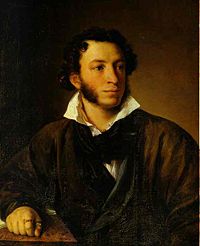 Aleksandr Pushkin by Vasily Tropinin |
|
| Born | June 6, 1799 Moscow, Russian Empire |
| Died | February 10, 1837 (aged 37) Saint Petersburg, Russian Empire |
| Occupation | Poet, novelist, playwright |
|
Influences
|
|
|
Influenced
|
|
Alexander Sergeevich Pushkin (Russian: Алекса́ндр Серге́евич Пу́шкин, pronounced [ɐlʲɪˈksandr sʲɪˈrgʲevʲɪtɕ ˈpuʂkʲɪn], listen) (June 6 [O.S. May 26] 1799–February 10 [O.S. January 29] 1837) was a Russian Romantic author who is considered to be the greatest Russian poet[1][2][3][4] and the founder of modern Russian literature.[5][6] Pushkin pioneered the use of vernacular speech in his poems and plays, creating a style of storytelling—mixing drama, romance, and satire—associated with Russian literature ever since and greatly influencing later Russian writers.
Born in Moscow, Pushkin published his first poem at the age of fifteen, and was widely recognized by the literary establishment by the time of his graduation from the Imperial Lyceum in Tsarskoe Selo. Pushkin gradually became committed to social reform and emerged as a spokesman for literary radicals; in the early 1820s he clashed with the government, which sent him into exile in southern Russia. While under the strict surveillance of government censors and unable to travel or publish at will, he wrote his most famous play, the drama Boris Godunov, but could not publish it until years later. His novel in verse, Eugene Onegin, was published serially from 1825 to 1832.
Pushkin and his wife Natalya Goncharova, whom he married in 1831, later became regulars of court society. In 1837, while falling into greater and greater debt amidst rumors that his wife had started conducting a scandalous affair, Pushkin challenged her alleged lover, Georges d'Anthès, to a duel. Pushkin was mortally wounded and died two days later.
Because of his liberal political views and influence on generations of Russian rebels, Pushkin was portrayed by Bolsheviks as an opponent to bourgeois literature and culture and a predecessor of Soviet literature and poetry[6]. In 1937, the town of Tsarskoe Selo was renamed Pushkin in his honor.
Contents |
Biography
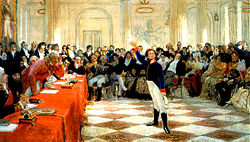
Pushkin's father Sergei Lvovich Pushkin (1770–1848) descended from a distinguished family of the Russian nobility which traced its ancestry back to the 12th century. Pushkin's mother Nadezhda Ossipovna Gannibal (1775–1836) descended through her paternal grandmother from German and Scandinavian nobility.[7][8] She was the daughter of Ossip Abramovich Gannibal (1744–1807) and his wife Maria Aleksejevna Pushkina, and her paternal grandfather, i.e. Pushkin's great-grandfather, a page raised by Peter the Great, was Abram Petrovich Gannibal, who was born in Africa.[9] One theory is that he came from an area in northern Ethiopia (then known as Abyssinia), on the banks of the Mareb River, from a town called Logon. More recent research, however, indicates that he came from the Sultanate of Logone-Birni south of Lake Chad in Cameroon. After education in France as a military engineer, Gannibal became governor of Reval and eventually General-en-Chef for the building of sea forts and canals in Russia.
Born in Moscow, Pushkin published his first poem at the age of fifteen. By the time he finished as part of the first graduating class of the prestigious Imperial Lyceum in Tsarskoe Selo near Saint Petersburg, the Russian literary scene recognized his talent widely. After finishing school, Pushkin installed himself in the vibrant and raucous intellectual youth culture of the capital, Saint Petersburg. In 1820 he published his first long poem, Ruslan and Lyudmila, amidst much controversy about its subject and style.
Pushkin gradually became committed to social reform and emerged as a spokesman for literary radicals. This angered the government, and led to his transfer from the capital (1820). He went to the Caucasus and to the Crimea, then to Kamenka and Chisinau, where he became a Freemason. Here he joined the Filiki Eteria, a secret organization whose purpose was to overthrow the Ottoman rule over Greece and establish an independent Greek state. He was inspired by the Greek Revolution and when the war against the Ottoman Turks broke out he kept a diary with the events of the great national uprising. He stayed in Chisinau until 1823 and wrote there two Romantic poems which brought him wide acclaim, The Captive of the Caucasus and The Fountain of Bakhchisaray. In 1823 Pushkin moved to Odessa, where he again clashed with the government, which sent him into exile at his mother's rural estate in Mikhailovskoe (near Pskov) from 1824 to 1826.[10] However, some of the authorities allowed him to visit Tsar Nicholas I to petition for his release, which he obtained. But some of the insurgents in the Decembrist Uprising (1825) in Saint Petersburg had kept some of his early political poems amongst their papers, and soon Pushkin found himself under the strict control of government censors and unable to travel or publish at will. He had written what became his most famous play, the drama Boris Godunov, while at his mother's estate but could not gain permission to publish it until five years later. The drama's original, uncensored version would not receive a premiere until 2007.
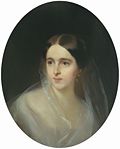
In 1831, highlighting the growth of Pushkin's talent and influence and the merging of two of Russia's greatest early writers, he met Nikolai Gogol. After reading Gogol's 1831–2 volume of short stories Evenings on a Farm near Dikanka, Pushkin would support him critically and later in 1836 after starting his magazine, The Contemporary, would feature some of Gogol's most famous short stories. Later, Pushkin and his wife Natalya Goncharova, whom he married in 1831, became regulars of court society. When the Tsar gave Pushkin the lowest court title, the poet became enraged: he felt this occurred not only so that his wife, who had many admirers—including the Tsar himself—could properly attend court balls, but also to humiliate him. In 1837, falling into greater and greater debt amidst rumors that his wife had started conducting a scandalous affair, Pushkin challenged her alleged lover (correction: man who insulted his wife), Georges d'Anthès, to a duel which left both men injured, Pushkin mortally. He died two days later.
The government feared a political demonstration at his funeral, which it moved to a smaller location and made open only to close relatives and friends. His body was spirited away secretly at midnight and buried on his mother's estate.
Pushkin had four children from his marriage to Natalya: Maria (b. 1832, touted as a prototype of Anna Karenina), Alexander (b. 1833), Grigory (b. 1835), and Natalya (b. 1836) the last of whom married, morganatically, into the royal house of Nassau to Nikolaus Wilhelm of Nassau and became the Countess of Merenberg.
Literary legacy
Critics consider many of his works masterpieces, such as the poem The Bronze Horseman and the drama The Stone Guest, a tale of the fall of Don Juan. His poetic short drama "Mozart and Salieri" was the inspiration for Peter Shaffer's Amadeus. Pushkin himself preferred his verse novel Eugene Onegin, which he wrote over the course of his life and which, starting a tradition of great Russian novels, follows a few central characters but varies widely in tone and focus. "Onegin" is a work of such complexity that, while only about a hundred pages long, translator Vladimir Nabokov needed two full volumes of material to fully render its meaning in English. Because of this difficulty in translation, Pushkin's verse remains largely unknown to English readers. Even so, Pushkin has profoundly influenced western writers like Henry James.[11]
Pushkin's works also provided fertile ground for Russian composers. Glinka's Ruslan and Lyudmila is the earliest important Pushkin-inspired opera, and a landmark in the tradition of Russian music. Tchaikovsky's operas Eugene Onegin (1879) and The Queen of Spades (1890) became perhaps better known outside of Russia than Pushkin's own works of the same name, while Mussorgsky's monumental Boris Godunov (two versions, 1868-9 and 1871-2) ranks as one of the very finest and most original of Russian operas. Other Russian operas based on Pushkin include Dargomyzhsky's Rusalka and The Stone Guest; Rimsky-Korsakov's Mozart and Salieri, Tale of Tsar Saltan, and The Golden Cockerel; Cui's Prisoner of the Caucasus, Feast in Time of Plague, and The Captain's Daughter; Tchaikovsky's Mazeppa; Rachmaninov's one-act operas Aleko (based on The Gypsies) and The Miserly Knight; Stravinsky's Mavra, and Nápravník's Dubrovsky. This is not to mention ballets and cantatas, as well as innumerable songs set to Pushkin's verse. Suppé, Leoncavallo and Malipiero, among non-Russian composers, have based operas on his works.[12]
Increased attention has also been given to Pushkin's apparent anti-Semitism, as well as that of other nineteenth-century Russian writers, Fyodor Dostoevsky and Nikolai Gogol.[13][14][15][16][17][18]
Influence on the Russian language

Alexander Pushkin is usually credited with developing Russian literature. Not only is he seen as having originated the highly nuanced level of language which characterizes Russian literature after him, but he is also credited with substantially augmenting the Russian lexicon. Where he found gaps in the Russian vocabulary, he devised calques. His rich vocabulary and highly sensitive style are the foundation for modern Russian literature. Russian literature virtually begins with Alexander Pushkin. His talent set up new records for development of the Russian language and culture. He became the father of Russian literature in 19th century, marking the highest achievements of 18th century and the beginning of literary process of 19th century. Alexander Pushkin introduced Russia to all the European literary genres as well as a great number of West European writers. He brought natural speech and foreign influences to create modern poetic Russian. Though his life was brief, he left examples of nearly every literary genre of his day: lyric poetry, narrative poetry, the novel, the short story, the drama, the critical essay, and even the personal letter. From him derive the folk tales and genre pieces of other authors: Esenin, Leskov and Gorky. His use of Russian language formed the basis of the style of novelists Ivan Turgenev, Ivan Goncharov, and Leo Tolstoy. Pushkin was recognized by Nikolay Vasilyevich Gogol, his successor and pupil, the great Russian critic Vissarion Grigoryevich Belinsky, who produced the fullest and deepest critical study of Pushkin's work, which still retains much of its relevance. Alexander Pushkin became an inseparable part of the literary world of the Russian people. He also exerted a profound influence on other aspects of Russian culture, most notably in opera. Translated into all the major languages, his works are regarded both as expressing most completely Russian national consciousness and as transcending national barriers. Pushkin’s intelligence, sharpness of his opinion, his devotion to poetry, realistic thinking and incredible historical and political intuition make him one of the greatest Russian national geniuses.
List of Works
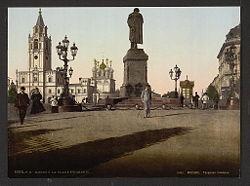
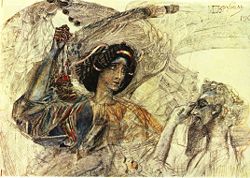
- Poems
- 1820 – Ruslan i Lyudmila (Руслан и Людмила); English translation: Ruslan and Ludmila
- 1820-21 – Kavkazskiy plennik (Кавказский пленник); English translation: The Prisoner of the Caucasus
- 1821 - Gavriiliada (Гавриилиада) ; English translation: The Gabrieliad
- 1821–22 – Bratya razboyniki (Братья разбойники); English translation: The Robber Brothers
- 1823 – Bakhchisaraysky fontan (Бахчисарайский фонтан); English translation: The Fountain of Bakhchisaray
- 1824 – Tsygany (Цыганы); English translation: The Gypsies
- 1825 – Graf Nulin (Граф Нулин); English translation: Count Nulin
- 1829 – Poltava (Полтава); English translation: Poltava
- 1830 – Domik v Kolomne (Домик в Коломне); English translation: The Little House in Kolomna
- 1833 - Andjelo (Анджело); English translation: Angelo
- 1833 – Medny vsadnik (Медный всадник); English translation: The Bronze Horseman
- Verse novel
- 1825-32 – Yevgeny Onegin (Евгений Онегин); English translation: Eugene Onegin
- Drama
- 1825 – Boris Godunov (Борис Годунов); English translation: Boris Godunov
- 1830 – Malenkie tragedii (Маленькие трагедии); English translation: The Little Tragedies
- Kamenny gost (Каменный гость); English translation: The Stone Guest
- Motsart i Salyeri (Моцарт и Сальери); English translation: Mozart and Salieri
- Skupoy rytsar (Скупой рыцарь); English translations: The Miserly Knight, The Covetous Knight
- Pir vo vremya chumy (Пир во время чумы); English translation: A Feast During the Plague
- Prose
- 1831 – Povesti pokoynogo Ivana Petrovicha Belkina (Повести покойного Ивана Петровича Белкина); English translation: The Tales of the Late Ivan Petrovich Belkin
- Vystrel (Выстрел); English translation: The Shot, short story
- Metel (Метель); English translation: The Blizzard, short story
- Grobovschik (Гробовщик); English translation: The Undertaker, short story
- Stanzionny smotritel (Станционный смотритель); English translation: The Stationmaster, short story
- Baryshnya-krestyanka (Барышня-крестьянка); English translation: The Squire's Daughter, short story
- 1834 - Pikovaya dama (Пиковая дама); English translation: The Queen of Spades, short story
- 1834 - Kirdzhali (Кирджали); English translation: Kirdzhali, short story
- 1834 - Istoriya Pugacheva (История Пугачева); English translation: A History of Pugachev, study of the Pugachev's Rebellion
- 1836 - Kapitanskaya dochka (Капитанская дочка); English translation: The Captain's Daughter, novel
- 1836 - Puteshestvie v Arzrum (Путешествие в Арзрум); English translation: A Journey to Arzrum, travel sketches
- 1836 - Roslavlev (Рославлев); English translation: Roslavlev, unfinished novel
- 1837 - Arap Petra Velikogo (Арап Петра Великого); English translation: Peter the Great's Negro, unfinished novel
- 1837 - Istoriya sela Goryuhina (История села Горюхина); English translation: The Story of the Village of Goryukhino, unfinished short story
- 1837 - Yegipetskie nochi (Египетские ночи); English translation: Egyptian Nights, unfinished short story
- 1841 - Dubrovsky (Дубровский); English translation: Dubrovsky, unfinished novel
- Tales in verse
- 1830 - Сказка о попе и о работнике его Балде; English translation: The Tale of the Priest and of His Workman Balda
- 1831 - Сказка о царе Салтане; English translation: The Tale of Tsar Saltan
- 1833 - Сказка о рыбаке и рыбке; English translation: The Tale of the Fisherman and the Fish
- 1833 - Сказка о мертвой царевне; English translation: The Tale of the Dead Princess
- 1834 - Сказка о золотом петушке; English translation: The Tale of the Golden Cockerel
Awards and honors
A minor planet, 2208 Pushkin, discovered in 1977 by Soviet astronomer Nikolai Stepanovich Chernykh is named after him.[19]
A crater, Pushkin, on Mercury is also named in his honor.
Hoaxes and other attributed works
In the late 1980s, a book entitled Secret Journal 1836–1837 was published by a Minneapolis publishing house (M.I.P. Company), claiming to be the decoded content of an encrypted private journal kept by Pushkin. Promoted with few details about its contents, and touted for many years as being 'banned in Russia', it was an erotic novel narrated from Pushkin's perspective. Some mail-order publishers still carry the work under its fictional description. In 2006 a bilingual Russian-English edition was published in Russia by Retro Publishing House.
See also
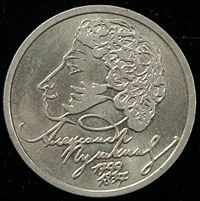
- Pushkin Prize
- Literaturnaya Gazeta
- Vasily Pushkin
- Anna Petrovna Kern
- Anton Delvig
- Vladimir Dal
- Fyodor Petrovich Tolstoy
Notes
- ↑ Short biography from University of Virginia, retrieved on 24 November 2006.
- ↑ Allan Reid, "Russia's Greatest Poet/Scoundrel", retrieved on 2 September 2006.
- ↑ BBC News, 5 June 1999, "Pushkin fever sweeps Russia", retrieved 1 September 2006.
- ↑ BBC News, 10 June 2003, "Biographer wins rich book price", retrieved 1 September 2006.
- ↑ Biography of Pushkin at the Russian Literary Institute "Pushkin House", retrieved 1 September 2006.
- ↑ 6.0 6.1 Maxim Gorky, "Pushkin, An Appraisal", retrieved 1 September 2006
- ↑ Лихауг [Lihaug], Э. Г. [E. G.] (November 2006). "Предки А. С. Пушкина в Германии и Скандинавии: происхождение Христины Регины Шёберг (Ганнибал) от Клауса фон Грабо из Грабо [Ancestors of A. S. Pushkin in Germany and Scandinavia: Descent of Christina Regina Siöberg (Hannibal) from Claus von Grabow zu Grabow]". Генеалогический вестник [Genealogical Herald].–Санкт-Петербург [Saint Petersburg] 27: 31–38.
- ↑ Lihaug, Elin Galtung (2007). "Aus Brandenburg nach Skandinavien, dem Baltikum und Rußland. Eine Abstammungslinie von Claus von Grabow bis Alexander Sergejewitsch Puschkin 1581–1837". Archiv für Familiengeschichtsforschung 11: 32–46.
- ↑ Aleksander Sergeevich Pushkin's descendants at Genealogics.org
- ↑ Images of Pushkin in the works of the black "pilgrims". Ahern, Kathleen M. The Mississippi Quarterly. Pg. 75(11) Vol. 55 No. 1 ISSN: 0026-637X. December 22, 2001.
- ↑ Joseph S. O'Leary, Pushkin in 'The Aspern Papers' , the Henry James E-Journal Number 2, March 2000, retrieved on 24 November 2006.
- ↑ Taruskin R. Pushkin in The New Grove Dictionary of Opera. London & New York, Macmillan, 1997.
- ↑ Russian Urges Quotas on Jews; Communists Begin to Split Over Comrade's Antisemitism. David Hoffman. The Washington Post, A Section; Pg. A28. November 12, 1998.
- ↑ Taking Penguins to the Movies: Ethnic Humor in Russia By Emil Draitser. P. 112. Google Book Citation
- ↑ Negative Images of Jews in Recent Russian Literature. Pereira, N G O. [1]
- ↑ The Development of Russian Verse: Meter and Its Meanings By Michael Wachtel. p. 26. Google Book Citation
- ↑ Puskin's "Black Shawl" poem. Fullbooks.com
- ↑ One Less Hope: Essays on Twentieth-century Russian Poets By Constantin V. Ponomareff."The Avarious Knight" poem. p. 161. Google Book Citation
- ↑ Schmadel, Lutz D. (2003). Dictionary of Minor Planet Names (5th ed.). New York: Springer Verlag. pp. p. 179. ISBN 3540002383. http://books.google.com/books?q=2208+Pushkin+QU3.
References
- Elaine Feinstein (ed.): After Pushkin: versions of the poems of Alexander Sergeevich Pushkin by contemporary poets. Manchester: Carcanet Press; London: Folio Society, 1999 ISBN 1-85754-444-7
- Serena Vitale: Pushkin's button; transl. from the Italian by Ann Goldstein. New York: Farrar, Straus & Giroux, 1998 ISBN 1-85702-937-2
- Markus Wolf: Freemasonry in life and literature. With an introduction to the history of Russian Freemasonry (in German). Munich: Otto Sagner publishers, 1998 ISBN 3-87690-692-X
- T. J. Binyon has written an English biography: Pushkin: A Biography (London: HarperCollins, 2002) (ISBN 0-00-215084-0; US edition: New York: Knopf, 2003; ISBN 1-4000-4110-4).
- Yuri Druzhnikov, Prisoner of Russia: Alexander Pushkin and the Political Uses of Nationalism, Transaction Publishers, 1998, ISBN 1-56000-390-1
- Н. К. Телетова [N. K. Teletova], Забытые родственные связи А.С. Пушкина [The forgotten family connections of A. S. Pushkin], Спб.: Дорн [Saint Petersburg: Dorn], 2007. ISBN 5-86197-070-0
External links
- Pushkin's Biography on kirjasto's Author's Calendar
- Short biography of Pushkin by Caryl Emerson
- Three reviews of T. J. Binyon's biography of Pushkin
- Essays on Pushkin to commemorate the 200th birthday anniversary
- Pushkin's biography
- Pushkin's poems (English translation) includes Eugene Onegin and other points
- Complete works (in Russian)—FEB-web's Digital Scholarly Edition (DSE) of A.S. Pushkin
- Complete works in ten volumes. (In Russian) From the Russian Virtual Library.
- Works by Aleksandr Pushkin at Project Gutenberg
- Books by Aleksandr Pushkin, eBooks
- The afro-american interpretation of the family history of Aleksandr Pushkin
- The ancestors Aleksander Sergeyevich Pushkin (In Russian)
- Poet's Page - audio readings in Russian
- Theatre History - Plays by Pushkin
- Pushkin's African Background
- Beliy A.A. «Génie ou neige» "Voprosy literaturi" № 1, Moscow, 2008. С.115. Contains annotations about Eugene Onegin.
- www.pushkingallery.com
|
||||||||||||||||||||
| Persondata | |
|---|---|
| NAME | Pushkin, Aleksandr Sergeyevich |
| ALTERNATIVE NAMES | Алекса́ндр Серге́евич Пу́шкин (Russian) |
| SHORT DESCRIPTION | Russian Poet, novelist, playwright |
| DATE OF BIRTH | June 6, 1799 |
| PLACE OF BIRTH | Moscow, Russia |
| DATE OF DEATH | February 10, 1837 |
| PLACE OF DEATH | Saint Petersburg, Russia |